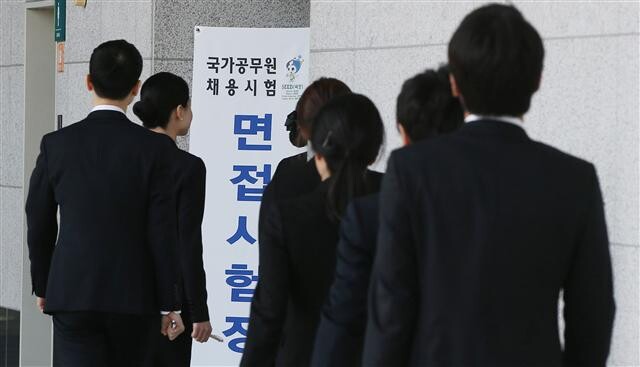hankyoreh
Links to other country sites 다른 나라 사이트 링크
Civil service exam tests political bias over competency

“For the personality test, they asked me to sing the third or fourth stanza of the national anthem and to draw the Korean flag. I felt sad during the interview, wondering if this was really the kind of ability required of public servants,” said an applicant who took the third and final interview on Oct. 30 and Oct. 31 to become a grade five civil servant in the South Korean government.
“On the first day of the interview, they asked us about the driving force behind the ‘Miracle of the Han River,’ but only gave us the five year economic plan as a relevant text. On the next day of the interview, they gave us a text about the New Village Movement. In the end, we had no choice but to talk about the leadership of former president Park Chung-hee,” the applicant told the Hankyoreh on Nov. 12.
“The interviewees were even joking about how the interview seemed to be dedicated to Park,” the applicant added.
This final interview for the selection of grade five civil servants (who will fill senior management positions in the government bureaucracy) controversially asked applicants ideologically biased questions such as whether they think there are forces trying to overthrow the government and what they think about demonstrations against state-issued textbooks and by instructing them to draw the South Korean flag. These questions were simply the result of faithfully adhering to guidelines drawn up by the Ministry of Personnel Management. In South Korea, these jobs are highly sought-after for their stability and generous pension program.
This past April, the Ministry issued a press release in which it announced the interview guidelines. “We‘re going to make the interview for hiring grade five public servants tougher by testing applicants’ public values and their work competency in each area,” the document says. The upshot was spending more time on the personality interview and on applicants‘ values (including their views on the nation, public service, and ethics), areas that had not been emphasized in previous years.
This policy of taking a closer look at public values came to light during the test to select grade nine public servants (lower-ranking bureaucrats who will mostly handle paper work), which took place this past July. Applicants for these positions were also asked during their interview whether they knew the fourth stanza of the national anthem or the four trigrams on the Korean flag.
Though these interview questions provoked controversy, the Ministry did not budge. “We concluded that these questions would at least stir up loyalty to the country and a spirit of service to the public. We are planning to apply these guidelines in the interviews for the grade five managers, technical positions, and grade seven general workers as well,” the Ministry said.
In line with these guidelines, the interviews in the civil service exam for grade five managers went beyond the national anthem and the South Korean flag to include a number of biased questions about the Park Chung-hee administration (1961-79) and the policies of the current administration.
“Analyzing policies wasn’t any help in this interview. I was thinking that I should have read a book about the five-year economic development plans instead,” said one person who took the interview for grade five civil servants.
“Questions like ‘do you think that there are forces aiming to overthrow the government’ were so overt that I even felt like I shouldn‘t answer in the manner intended by the interviewer,” another interviewee said.
“Public servants need to be patriotic, but questions about things like history textbooks demand not patriotism but loyalty to an administration that is insisting on a particular ideology. These questions emphasize ideological bias under the guise of assessing applicants’ patriotism and view of the state,” said Jin Jae-gu, a professor of public administration at Cheongju University.
By Park Su-ji and Hwang Keum-bi, staff reporters
Please direct questions or comments to [english@hani.co.kr]

Editorial・opinion
![[Editorial] Penalties for airing allegations against Korea’s first lady endanger free press [Editorial] Penalties for airing allegations against Korea’s first lady endanger free press](https://flexible.img.hani.co.kr/flexible/normal/500/300/imgdb/original/2024/0502/1817146398095106.jpg) [Editorial] Penalties for airing allegations against Korea’s first lady endanger free press
[Editorial] Penalties for airing allegations against Korea’s first lady endanger free press![[Editorial] Yoon must halt procurement of SM-3 interceptor missiles [Editorial] Yoon must halt procurement of SM-3 interceptor missiles](https://flexible.img.hani.co.kr/flexible/normal/500/300/imgdb/child/2024/0501/17145495551605_1717145495195344.jpg) [Editorial] Yoon must halt procurement of SM-3 interceptor missiles
[Editorial] Yoon must halt procurement of SM-3 interceptor missiles- [Guest essay] Maybe Korea’s rapid population decline is an opportunity, not a crisis
- [Column] Can Yoon steer diplomacy with Russia, China back on track?
- [Column] Season 2 of special prosecutor probe may be coming to Korea soon
- [Column] Park Geun-hye déjà vu in Yoon Suk-yeol
- [Editorial] New weight of N. Korea’s nuclear threats makes dialogue all the more urgent
- [Guest essay] The real reason Korea’s new right wants to dub Rhee a founding father
- [Column] ‘Choson’: Is it time we start referring to N. Korea in its own terms?
- [Editorial] Japan’s rewriting of history with Korea has gone too far
Most viewed articles
- 1Months and months of overdue wages are pushing migrant workers in Korea into debt
- 2[Editorial] Penalties for airing allegations against Korea’s first lady endanger free press
- 3Bills for Itaewon crush inquiry, special counsel probe into Marine’s death pass National Assembly
- 4[Reporter’s notebook] In Min’s world, she’s the artist — and NewJeans is her art
- 560% of young Koreans see no need to have kids after marriage
- 6S. Korea discusses participation in defense development with AUKUS alliance
- 7Trump asks why US would defend Korea, hints at hiking Seoul’s defense cost burden
- 81 in 3 S. Korean security experts support nuclear armament, CSIS finds
- 9Korean firms cut costs, work overtime amid global economic uncertainties
- 10[Guest essay] Maybe Korea’s rapid population decline is an opportunity, not a crisis